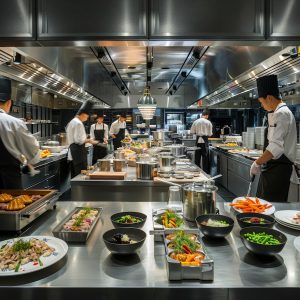Mistake #4: Not Applying for Grants and Scholarship
Though notoriously high, culinary school costs don’t have to be overwhelming. In fact, most students receive some financial assistance through loans, scholarships, grants, or work-study programs.
Why Is It A Mistake?
Not applying for grants and scholarships for culinary school is a significant mistake, primarily because of the missed financial relief and the inspiring opportunities for personal and professional growth they offer. Culinary education can be expensive, and the burden of student loans can be daunting.
However, grants and scholarships provide crucial financial support, reducing the need for loans and allowing students to focus more on their education and less on financial stress, inspiring and motivating them to reach their full potential. Grants and scholarships are not merely financial aid but also endorse a student’s potential and dedication.
A scholarship or grant can enhance a student’s resume, making them more attractive to potential employers. These accolades demonstrate a commitment to the field and recognition from established institutions, which can open doors to internships, job placements, and networking opportunities that might otherwise be inaccessible.
Furthermore, many scholarships and grants are offered by prestigious culinary organizations and associations, which provide financial support and crucial mentorship, resources, and industry connections. Being part of such networks can significantly influence a student’s career trajectory, offering a solid support system and growth opportunities beyond the classroom, making them feel supported and connected within the culinary community.
Additionally, applying for grants and scholarships encourages students to engage deeply with their chosen field. The application process often requires students to articulate their goals, achievements, and passion for culinary arts, fostering a deeper self-awareness and commitment to their career path. This reflective process can be invaluable in helping students clarify their aspirations and motivations, setting a solid foundation for their future careers.
In essence, not applying for grants and scholarships for culinary school means missing out on financial support, recognition, networking opportunities, and personal growth. These resources can alleviate financial burdens, enhance career prospects, and provide a support system within the culinary community. Therefore, aspiring culinary professionals should seize every opportunity to apply for these valuable resources.
Learn What Grants and Scholarships are Offered through the School
Almost every culinary school has a financial aid department. Most of them offer financial planning services that provide advice and assistance on identifying and applying for financial aid of all kinds. However, while this can be a great resource, don’t rely solely on the department to help you finance school. Their first goal is to get you to sign up for their school; how you pay is really up to you.
You should always begin by filling out a FAFSA (Free Application for Federal Student Aid) form. This is the national standard in education funding, and it determines your financial eligibility for grants, loans, and work-study programs.
This eligibility is based almost entirely on your income, your parents’ income (if you are under 23 and unmarried), and the amount of money the school has available.
If you qualify for grants or work-study, taking advantage of these options is usually a good idea, since they don’t require repayment. Remember, though, that all loans will need to be repaid. If there’s another way to pay for school, use that first.
Many culinary schools also have their own scholarships, which you can find by looking on their website or by talking with your financial aid adviser on site. Unfortunately, everyone usually wants to take advantage of these, so you can safely assume that the competition will be fierce.
While this should never stop you from applying, you may need to look elsewhere for money. Good places to look include:
- Professional culinary organizations
- High school counselors
- Libraries
- Employers (food industry and others)
- The Internet
This last option might be your best one since many online resources make it their job to find the best funding opportunities available today. No matter what else you do, be sure to take the time to apply.
Although the scholarship application process can be time-consuming and frustrating, the only way to get money is to ask.













2 Responses
I would love to have this scholarship because i have a big passion for culinary arts, and would also like to follow my dreams. I never thought that i would get this far but i did, i would like to go as far as i could possibly go in life and i know that it starts here.
l am a young lady aged 23,who is fascinated and passionate about food.l love everything which has to do with food and cooking.My dream and goal is to become a chef,seeing myself reaching greater heights in my culinary journey.Being awarded a scholarship will mean the world because,l will able to live and achieve my dream.Thank you